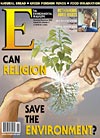
 |
|
Volume XIII, Number 6 CONVERSATIONS |
 |
|
E Magazine: Since the world’s religions considerably predate our modern consciousness about the environment, do they sometimes lack the language to discuss the critical issues we face? John Grim: While acknowledging the limits and problems of religions, we also know they have been guiding and motivating forces for people. As ancient vehicles of reflection on the human condition, the world’s religions are wisdomkeepers. Yet, these traditions have not been confronted by anything of the magnitude of the environmental challenge. Many people are struck by the depths of symbolic thought in the religions on our relationship with the Earth. So what we are trying to encourage in these religious traditions is a reevaluation of key ideas and experiences in terms of the environmental crisis. I’ve heard some people say that what we really need is a new Earth-based religion. Because of their disappointment with major religions and because of the experience of modern secular life, many people search for meaning in novel ways. The ancient religious traditions still have something to contribute to this search because many religious rituals are closely connected to the seasons and to the natural world. What the environmental crisis does, however, is cause the religions to reexamine these ancient natural symbolisms embedded within them. There may be those who are called to form new religions. But the established religions are not frozen entities; they’ve always been growing and changing. The concept of Gaia, as developed by scientist James Lovelock, holds that life on Earth sustains and shapes the planet. Could this theory be a unifying spiritual force? The concept of Gaia is a striking insight into the intricate relationship of the temperature and atmosphere of Earth as maintaining the conditions for life, but it carries with it much of the baggage of the western world. One example is the common tendency to see Native Americans as having a Mother Earth concept. But indigenous North Americans are very diverse in their beliefs, and this is rarely considered in our view of their environmental concerns. They have Father Earth concepts as much as Mother Earth. In Native traditions, the Earth is more a matrix for sustaining life than a living entity like Gaia. Given the magnitude and urgency of the environmental crisis, do we have time for the religious transformation to occur? Environmental issues can no longer be ignored. And when people get a grasp of what’s happening, and have religious leadership like that represented by the Greek Patriarch, they will hopefully move very quickly. But as you say, these traditions have been very slow moving and that’s a concern. The alternative that’s often advanced is the so-called “techno-fix,” involving pesticides and biotechnology like genetic engineering. I find that a singularly impoverished approach. The techno-fix response shows no awareness of the need in the human for the deep inner beauty, awe, and even terror of natural processes. Advocates of a techno-fix approach dismiss any sense of environmental crisis by proposing futuristic scenarios that do not adequately acknowledge the extent of biodiversity extinctions, global warming, or the pressures of population growth. That said, I’m not totally convinced that the major faiths will be able to generate the kind of transforming processes we need right now. Religious expressions have grown completely apart from and oblivious to our sustaining Earth. It may take even deeper crises—over endangered species or global warming—to generate more rapid change. What is the Forum on Religion and Ecology doing to assist religious transformation? The Forum brings religious scholars into gatherings where they can explore their relationships to the contemporary ecological crisis. We also have a website that details texts, ideas and case studies from different religious traditions. And we hold high school teacher workshops to assist educators in their efforts to bring religion and ecology components into their world religion courses. |